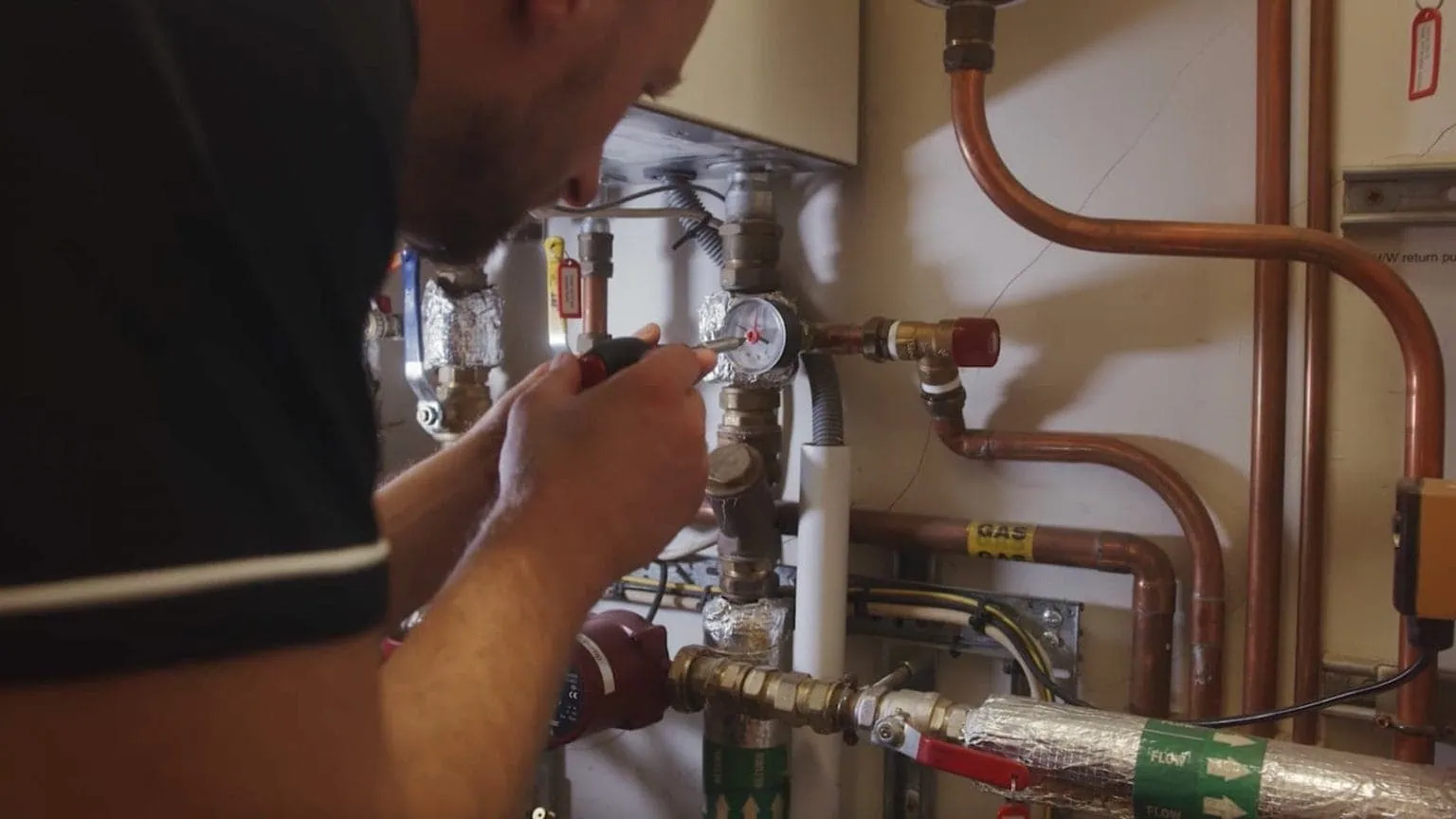Why does my boiler pressure keep dropping or losing pressure?
Most UK homes currently use a gas boiler to provide heating and hot water. Even with regular maintenance, issues can and often do happen. One of the most common faults is system pressure loss. When the boiler’s pressure drops below 0.9 bar of pressure, it may cut out as a safety measure; this could leave your taps, shower and radiators cold when you need hot water.
In this guide, we discuss the ideal pressure level, the reasons behind pressure loss, and how to repressurise your system. We also explain what to do when your boiler keeps losing pressure, and when you need the help of a gas engineer.

What’s the right pressure level?
A central heating system is sealed, and the water within it is held under pressure. The term ‘boiler pressure’ refers to the water pressure inside the whole heating system. If the water level drops, so does the boiler pressure.
You can check the pressure level by looking at the gauge or LCD display on the front of your boiler. Most boilers should display between 1.2 and 1.5 bar of pressure when the system is “cold”. When hot, that figure should rise to about 2 bar. Anything above 2.5 is too high, and your boiler should switch off automatically once it reaches 3 bar.
These numbers can vary between different makes and models, so it’s worth checking your boiler’s manual given at installation just to make sure.
Why does the pressure change when the system is turned on?
The pressure level is higher while the boiler’s running because of water expansion. As the water heats up, its volume increases by around 4%. This raises the pressure level inside your system, causing the bar reading on your boiler to increase.
When the system’s hot, it’s normal for the pressure to rise by around three-quarters of a bar. That’s why you don’t want your system to read any higher than 1.5 bar when it’s cold.
Book a qualified gas engineer

Our gas and heating engineers are available for both domestic and commercial work.
- Gas Safe-registered experts
- Quick response time
- Boiler servicing from £94.50 + VAT
- Half-hour maintenance rates from £49.50 + VAT
Is low boiler pressure dangerous?
A loss of system pressure isn’t dangerous, but it does impact your boiler’s ability to keep your property warm. If you own a system or combi boiler, it’ll probably shut down and display an error code if the pressure falls below 0.9 bar – leaving you without heating or hot water. Boiler pressure loss affects systems in different ways, however, and if you own a hot water cylinder, you’ll have hot water until it runs out.
Why is my boiler losing pressure?
According to the boiler manufacturer, Vaillant, sudden pressure loss usually happens if there’s a leak in the system. It can also happen when there’s a faulty part, like a problem with the expansion vessel. Another potential cause is a pressure level above 3 bar; once it hits this level, the water will be expelled via a pressure relief valve, the pressure will fall and the boiler will turn off.
Boilers can also get air inside them, even though they’re ‘sealed’ systems. Small vents allow air to escape the system as it circulates, but these vents can also pull in the air from outside. Air commonly affects the manifolds of underfloor heating systems too, causing the pressure to drop.
We recommend checking the pressure level twice a year between seasons, when pressure levels will naturally change. If the pressure falls and needs adjusting more regularly, you should contact a gas engineer.
You can try to remove air from the system by bleeding your radiators, but only if you’re sure you can do it safely and correctly.
Got a fault code? The code on your boiler’s display can indicate the nature of the fault. For example, F22 on a Vaillant boiler could mean there’s a loss of pressure because of air or a system leak, while an F75 could indicate an issue with the pressure sensor or circulation pump. A gas engineer will be able to diagnose the true cause of the fault code and fix the issue for you.
How do I fix low boiler pressure?
Most pressurised systems and combi boilers are easy to repressurise, but if there’s a fault, it’ll only be a short-term fix. All you have to do is fill the system with more water. Start by finding the ‘filling loop’, which is a bendy pipe attached to two valves on the boiler that you can turn. We outline the steps you should take below:
- Check the fault code to make sure it’s a pressure issue
- Position yourself near the filling loop for easy access
- Turn the right valve by 90 degrees
- Next, turn the left valve slowly, also by 90 degrees
- You should now hear your boiler pressure rising
- Wait for the display to read between 1.2 and 1.5 bar
- Close both valves to prevent over-pressurisation
- Press the reset button if the fault code is still showing
We recommend keeping a record of when you do this just in case your boiler pressure keeps dropping. If you notice your boiler losing pressure every six months or less, we recommend getting a qualified engineer to inspect the system.
What if a gas engineer can’t find a fault?
When investigating boiler pressure loss, a gas engineer will check many of the internal components. They’ll also check for damp patches around the boiler, radiators and connected pipes for visible signs of a leak. If the reason for the pressure loss remains a mystery, the leak could be on a concealed part of the system. In this case, you will probably need a leak detection expert.
What is leak detection? This specialist service is the most efficient way to find hidden leaks. The leak investigator uses multiple non-invasive techniques to pinpoint the leak’s origin. These include thermal imaging, acoustic tests, pressure testing, and tracer gas testing.
What happens if I increase the pressure too much?
High pressure can damage your boiler if it isn’t reduced. Thankfully, your boiler has a pressure relief valve that expels excess water through a small pipe in the system. Once the water is expelled and the pressure drops, your boiler will switch off for safety reasons.
If your boiler’s pressure is too high, you shouldn’t try to bleed your radiators. We recommend getting a Gas Safe-registered engineer to investigate. They can diagnose the reason for the pressure increase and check the system for any damage it may have caused.
How can I keep my boiler running efficiently?
Annual boiler servicing is the best way to prevent issues with your central heating system. Vital for every gas boiler, this multipoint inspection gives an engineer the chance to look over its components and ensure your boiler is working as it should. The service could also highlight issues that may cause the boiler to lose pressure or register the wrong pressure level.
No heating or hot water?
With a team of qualified gas engineers, Aspect can investigate any central heating fault and assist when your boiler keeps losing pressure. If you need priority attendance, we’ll aim to reach you in one hour at no extra cost. Our engineers carry a wide selection of parts, so they’re able to complete certain emergency boiler repairs right away.We can help with hidden leaks, too. Our leak investigators use cutting-edge methods to find a leaking pipe or radiator as quickly as possible. Book online if you’re stuck with cold water, no heating, or if your boiler pressure keeps dropping.
Areas we cover

If you have a hidden leak in a central heating system, our experts are ready to help.
We can schedule leak detection work in Bedfordshire, Berkshire, Buckinghamshire, Cambridgeshire, East Sussex, Essex, Greater London, Hampshire, Hertfordshire, Kent, Norfolk, Northamptonshire, Oxfordshire, Suffolk, Surrey, West Sussex, and Wiltshire.
If you are outside of this coverage area, we may still be able to assist you. Our scheduling team will check availability for your location. Call or submit a callback request, and a member of our team will be in touch with you.
Was this article helpful?
Think we could improve this article? Please let us know